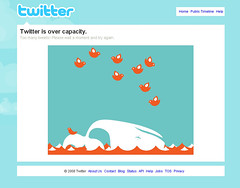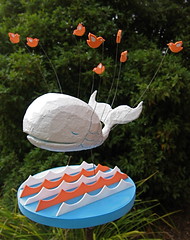Warning: If you’re sick of hearing about micro-blogs like Twitter, Pownce, Jaiku, and Plurk, today’s podcast might not be for you.
 Those of you who’ve been listening for a while (at least since show 128) may recall how enthusiastic I was over a website called Twitter. I found micro-blogging to be incredibly addictive in spite of its 140 character limit because the conversations were worthwhile. I quickly established a PLN (or Personal Learning Network) of fellow educators and thoroughly enjoyed the learning (and joking around) that ensued.
Those of you who’ve been listening for a while (at least since show 128) may recall how enthusiastic I was over a website called Twitter. I found micro-blogging to be incredibly addictive in spite of its 140 character limit because the conversations were worthwhile. I quickly established a PLN (or Personal Learning Network) of fellow educators and thoroughly enjoyed the learning (and joking around) that ensued.
Then Jaiku came along, and I hoped with all my heart that the people in my PLN would all jump ship and move over to there. Alas, while some did, most didn’t bother, so I eventually abandoned Jaiku and reluctantly returned to Twitter.
Fast forward to the creation of Pownce, and history repeats itself.
I loved Pownce for many reasons, most of which I won’t go over here. Its coolest feature however was the ability to have threaded conversations. Reading through the posts of everyone I’m following on Twitter is like standing in the middle of a crowded room. You hear snippets, but not always a complete conversation.
Ok, usually not. The problem was while I would often see people responding to other Twitter-ers, I wouldn’t see what was being responded to unless I was also following that other person. Through the creative use of putting “@” in front of user names I could find that individual, but if they were prolific with their tweets then it would still be hard to follow the conversation.
 And remember, it was conversations that made Twitter cool in the first place.
And remember, it was conversations that made Twitter cool in the first place.
The best way to solve this seemed to be following everyone that everyone else in my PLN followed, but there is a physical and mental limit to how many people I can follow so I merely replaced one problem with another.
I still think Pownce is among the best micro-blog formats out there, but the only times my PLN moved over there were when Twitter was down. Granted, that meant they were there a lot, but never to stay. Most conversations on Pownce could be summarized as follows:
“Oh, Twitter’s down again.”
“Is Twitter up yet?”
“No. It’s so annoying that it’s down so often.”
“I know! I’m about ready to – hey, it’s back up!”
And that’s the last I would see of them on Pownce until the next Twitter outage.
So once again, I abandoned a better service for Twitter. As much as I liked Pownce, I had to stay with my PLN.
 And then came Plurk.
And then came Plurk.
Plurk has a few annoying things about it, most notably a lack of text messaging support and a right-to-left scrolling “timeline,” but every post can receive threaded responses so my main problem with Twitter is already solved.
Plurk also has something called “karma.” This has nothing to do with reincarnation, it’s simply a score for how well you’re interacting with others. I’m not too certain about the algorithm used, but I do know that your score goes up more for posting only a few “plurks” that generate responses from others than it does from posting 1,000 “plurks” and getting few, if any, responses. Your karma can go up as you gain followers, but the method I’ve seen on Twitter of going through and following hundreds of people in an attempt to get them to follow you in return will actually hurt your score.
That’s something cool that I didn’t expect to see in a micro-blog. In my opinion one of the cancers of Web 2.0 sites has been the large number of people who treat it as simply a game where whomever has the most followers wins. I’d first heard of this happening on MySpace when a friend complained that her brother had more “friends” than she did, even though he didn’t really know most of them and she knew all of hers. (I think she wanted me to create an account so her score would go up by one … I still didn’t.) I’ve since seen this problem on Facebook, Twitter, Jaiku, YouTube, and even to a limited extent on Pownce.
But I’ve yet to see it on Plurk. They’ve essentially replaced one score, your number of followers, with another score, karma. There are still ways to game the system, I’m sure, but I’m not getting 20 friend requests a day from people who are already following over 1,000 others on this service, and I like it better that way. (I often block those people when I see them on Twitter.)
On top of that, Plurk’s karma score encourages more meaningful conversation than Twitter did. Posts itemizing everything you’re doing from minute to minute can actually lower your score, as you won’t get many responses to “Hey, I just made some hashbrowns.”
Plurk also has something else: Steve Dembo. Steve’s taken a liking to Plurk himself, and as a result many of those in my PLN have either made the switch or are now active in both. My one reason for staying on Twitter is gone. If I check only Plurk I feel that I have a sufficiently large and knowledgeable PLN.
Or do I? There are enough people who haven’t made the switch to make me wonder, so I did a little three-part assessment of my PLNs on both services. Using Ping.fm I posted to both sites simultaneously, setting up a series of hoops to jump through.
Round 1: “Is this thing on?”
 This was simply to test the waters to see who was not only listening, but willing to respond. I wasn’t too surprised that my first response came from someone on Twitter – after all, I have more followers there, so at any given time it’s more likely that someone’s loading their Twitter client right after I’ve posted something. What Twitter didn’t have was staying power. Responses there tapered off after only 6 responses out of 273 followers.
This was simply to test the waters to see who was not only listening, but willing to respond. I wasn’t too surprised that my first response came from someone on Twitter – after all, I have more followers there, so at any given time it’s more likely that someone’s loading their Twitter client right after I’ve posted something. What Twitter didn’t have was staying power. Responses there tapered off after only 6 responses out of 273 followers.
Plurk, on the other hand, had 18 different people respond out of a smaller pool of 68 followers, some of them responding more than once.
These numbers included some people who were unbiased and used both services, and therefore responded using both services.
It should be noted that when I posted the round 1 results, at least two people on Twitter complained and more than one person on Plurk thought the result was very unexpected.
Round 1 Winner: Plurk
Round 2: “I have a question.” (a: Work b: Play)
 One of the reasons for having a PLN is to use it as a resource when looking for answers. With that in mind, I asked two questions. The first one asked for useful online tutorials for the free, open source Photoshop replacement known as GIMP. Responses were limited to one on each side, but the one from Twitter was to a page that listed multiple tutorial sites, including the one that the Plurk responder provided.
One of the reasons for having a PLN is to use it as a resource when looking for answers. With that in mind, I asked two questions. The first one asked for useful online tutorials for the free, open source Photoshop replacement known as GIMP. Responses were limited to one on each side, but the one from Twitter was to a page that listed multiple tutorial sites, including the one that the Plurk responder provided.
My second question was for people to “waste my time” by letting me know what their favorite web-based games were. Chris Craft posted a creative game involving Google searches on Twitter, but on Plurk the same question got me two very well designed Flash games and one reference to building up one’s karma score. Oh yeah, and someone complaining that after they read the answers they wasted some of their own time playing those games.
On top of that the conversation in that thread continued on Plurk even after I posted the results, hammering in the solid win for Plurk.
Round 2 Winner: Tie (a: Twitter, b: Plurk)
Round 3: “Convince me.”
 For the third and final round I simply asked for people to tell me why their micro-blog of choice was better. I received just one answer on Twitter, though it was concerning Twitter’s compatibility with text messaging services so it was a darned good argument.
For the third and final round I simply asked for people to tell me why their micro-blog of choice was better. I received just one answer on Twitter, though it was concerning Twitter’s compatibility with text messaging services so it was a darned good argument.
On Plurk I had several responses, ranging from short and sweet to links to full-fledged blog posts on the subject.
Round 3 Winner: Plurk
So there you go, my take on the micro-blog battleground. I don’t expect Twitter to go away ay time soon, but apparently I’m getting a lot more out of Plurk than Twitter these days.
And hey, whether or not you agree with my somewhat subjective results, I’d love to hear your opinion in 140 characters or more. You could always leave a comment here, but I’d rather see you write your own blog post or record your own podcast on the subject. If you link back to me when you post it, I’ll be sure to see it when I search Technorati or Google.